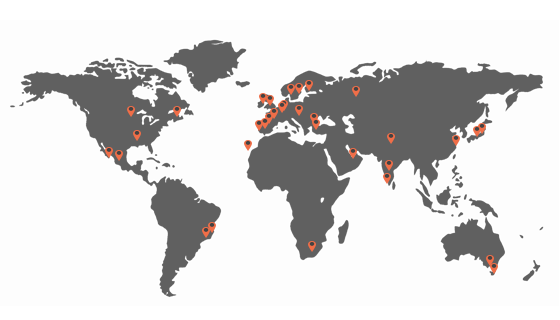You Never Fail Until You Stop Trying
Overcoming resistance and managing uncertainty is determining innovation outcomes. Those were Joseph Schumpeter’s, the famous economist, words in 1928. He also said, “Successful innovation is a feat not of intellect but of will” (1). I could not agree more with him! That’s why being persistent, is the quality that makes you deliver results, taking an idea from scratch to it’s market success. I like to share with you three examples of Dyson, IKEA and AIRBNB in which persistency has played a leading role.
First of all, did you know that the inventor James Dyson had made 5,127 prototypes of his famous Dual Cyclone bagless vacuum cleaner before settling on the model that would make him a billionaire (2)? It’s surely an amazing example of the perseverance of a true innovator, convinced of his new technology to create value.
A second example of great persistence is Ingvar Kamprad, the founder of IKEA, the Swedish furniture retailer. Malcolm Gladwell mentions in his book David & Goliath (3) the story of how he got started: “His great innovation was to realize that much of the cost of furniture was tied up in its assembly: putting the legs on the table not only costs money but also makes shipping the table really expensive. So he sold furniture that hadn’t been assembled, shipped it cheaply in flat boxes, and undersold all his competitors. In the mid-1950s however, Kamprad ran into trouble. Swedish furniture manufacturers launched a boycott against IKEA. They were angry about his low prices, and they stopped filling his orders. IKEA faced ruin. Desperate for a solution, Kamprad looked south and realized just across the Baltic Sea from Sweden was Poland, a country with much cheaper labor and plenty of wood. That’s Kamprad’s openness: few companies were outsourcing like that in the early 1960s. Then Kamprad focused his attention on making the Polish connection work. It wasn’t easy. Poland in the 1960s was a mess. It was a communist country. It had none of the infrastructure or machinery or trained workforce or legal protections of a Western country. But Kamprad pulled it off. “He is a micromanager,” says Anders Aslund, a fellow at the Peterson Institute for International Economics. “That’s why he succeeded where others failed. He went out to these unpleasant places, and made sure things worked. He’s this extremely stubborn character. That’s conscientiousness. But what was the most striking fact about Kamprad’s decision? It’s the year he went to Poland: 1961. The Berlin Wall was going up. The Cold War was at its peak. Within a year, East and West would come to the brink of nuclear war during the Cuban Missile Crisis. The equivalent today would be Walmart setting up shop in North Korea. Most people wouldn’t even think of doing business in the land of the enemy for fear of being branded a traitor. Not Kamprad. He didn’t care a whit for what others thought of him. That’s disagreeableness.”
Successful innovation is a feat not of intellect but of will.
A third and recent example of a startup with persistency is AIRBNB. Two years after graduating from the Rhode Island School of Design in 2005, Brian Chesky and Joe Gebbia moved to San Francisco where they shared a three-bedroom apartment. When a major design conference came to town in 2007, they saw an opportunity to earn some extra cash by renting out their spare floor space. In no time they had put together a website advertising lodging for overnight guests. Later on, Chesky and Gebbia approached Joe’s former roommate, Nathan Blecharczyk, about handling the technical side of the “Airbed and Breakfast” website, as something of a side gig. As they explain, their concept had quite a casual character from the start, “We were offering full bed and breakfast service, but we didn’t have any beds, so we called it Airbed and breakfast.” In August 2008 an improved Airbed and Breakfast website was introduced and was marketed towards business travelers as a more affordable alternative to hotels. Airbed and Breakfast got a lot of media coverage and even caught the attention of The Wall Street Journal. In their business model they charged the guest a service fee of 6 to 12 percent for a reservation, and the host a 3 percent commission fee. The next trial run took place in Denver during the week of the Democratic National Convention. Convention delegates had access to 900 lodging options via the Airbed and Breakfast website. The start-up site ultimately booked 50 accepted reservations during the convention. Without any additional special events, Airbed and Breakfast’s weekly revenue amounted to roughly $200 in the fourth quarter of 2008. Discouraged, the founders questioned whether it was time to just throw in the towel. However, it was anticipated that the upcoming presidential inauguration would draw millions of visitors to the Washington D.C. area. This was the next real opportunity for Airbed and Breakfast. They were able to generate free publicity on the site and successfully generated 150 bookings. Nevertheless, once the event ended, the company’s prospects remained bleak. As the number of bookings staggered, the Airbed and Breakfast website was on the brink of being shut down. Instead, they persisted and decided to join in 2009 Y-Combinator, a start-up incubator program located in Mountain View, California, where they pivoted their concept again. Five years after the start, AirBnB was valued a $2.5 billion company with revenues of $250 million, with a presence in over 34,000 cities around the globe.
Innovation is a long and difficult journey. I like to encourage you, in moments of despair, to continue you efforts in realizing your big dream. When you’re experiencing another experiment which did not deliver the results you hoped for, I hope you will find strength in this wonderful quote of Albert Einstein:
You Never Fail Until You Stop Trying.
Keep Trying! Wishing you lots of success.
[picture: credits Jessica Gosling – Flickr.com]









No Comments